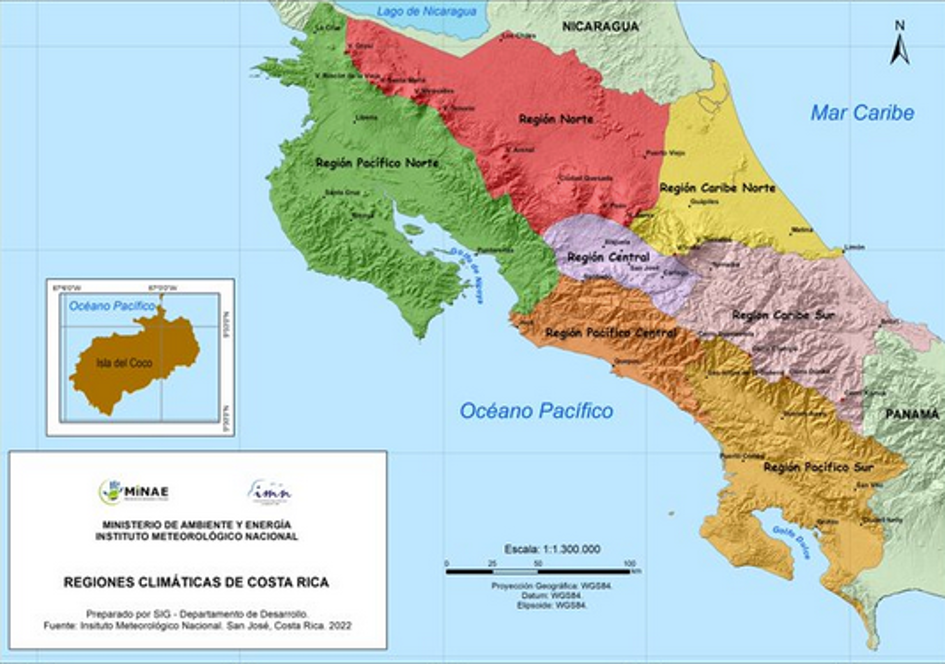German-Costa Rican Center for Climate Adaptation and Infectious Diseases GC-ADAPT
Head and Contact: Dr Andrea Molina Alvarado, co-PI Prof. Dr Jürgen May
Team Germany: Dr Eva Lorenz, M.Sc. Jonathan Ströbele, M.Sc. Juliane Boenecke, Dr Denise Dekker
Team Costa Rica / INCIENSA: M.Sc. Lissette Navas Alvarado, Dr Anamariela Tijerino Ayala, M.Sc. Francisco Duarte, M.Sc. Grettel Chanto Chacón, Gletty Oropeza Barrios
Team Costa Rica/ Instituto Metereológico Nacional (IMN): M.Sc. Karina Hernández Espinoza, Rubén Morales Aguilar, Nury Sanabria Valverde
More than half of known infectious diseases are climate-sensitive and can become more prevalent due to the effects of climate change, particularly rising temperatures, changes in humidity, droughts and floods. In addition, an increase in ambient temperature can lead to an increased risk of the spread of antibiotic-resistant pathogens. According to the WHO, antimicrobial resistance (AMR) is now one of the greatest global threats to humans, alongside climate change. Climate-sensitive infectious diseases and AMR must therefore be considered in the context of climate change. Understanding (and monitoring) the effect of climate change in infectious diseases and AMR is therefore a key part of climate change adaptation - but it is only just beginning in practice.
The main objective of the German-Costa Rican Centre for Climate Adaptation and Infectious Diseases GC-ADAPT is to establish a long-term, sustainable, international and interdisciplinary structure for research on infectious diseases under different climatic conditions as an adaptation measure to the climate change. The integration of climate data into surveillance and research on climate-sensitive infectious diseases and AMR will play a central role in this research structure; risk and climate analyses for infectious diseases will be carry on in order to develop prevention and adaptation plans in the climate change context.
The new research partner structure between BNITM in Germany, Inciensa (Instituto Costarricense de Investigación y Educación en Nutrición y Salud) and Instituto Metereológico Nacional (IMN) in Costa Rica will enable research under a range of tropical climatic conditions and will initially focus on infectious diseases of bacterial origin transmitted through animals (zoonoses) and food (and water), as well as antimicrobial resistance. This research structure will be the first of its kind in Latin America.
The planned research topics to be addressed under GC-ADAPT include:
| • Monitoring and surveillance of climate-sensitive infectious diseases and antimicrobial resistance under different environmental conditions and climatic phenomena; | |
| • Investigating the effects of local environmental factors such as temperature, humidity, heavy rainfall, drought and flooding on the pathogenesis, virulence and antibiotic resistance of bacterial pathogens; | |
| • Investigate the impact of climate change on the transmission of foodborne and/or zoonotic bacterial diseases; | |
| • Risk assessment of infectious diseases and AMR in the context of climate change; | |
| • Development of automated early warning mechanisms for eco-epidemiological risks to public health from climate-sensitive pathogens; | |
| • Assessing the impact of climate change adaptation measures on the spread of climate-sensitive infectious diseases. |
Project partner incl. partner country (full name)
Instituto Costarricense de Investigación y Educación en Nutrición y Salud (INCIENSA), Costa Rica
Instituto Meteorológico Nacional (IMN), Costa Rica
Prof. Dr. Jana Sillmann, Research Unit Sustainability and Climate Risks, University of Hamburg (UHH), Germanny
Funding
| Funding Period | 11/2024-10/2029 |
| Funding Bodies | German Federal Ministry of Education and Research (BMBF) |
Climate zones of Costa Rica

Associated lab group / working group
Infectious disease Epidemiology, Lab Group Krumkamp-Lorenz, iACE/Puradiredja, One Health/Dekker

Dr. Andrea Molina Alvarado
Telefon: +49 (0)40 285380-268
E-Mail: andrea.molina@bnitm.de
Contact
- Dr. Andrea Molina Alvarado
- Infectious Disease Epidemiology Department
- Telefon: +49 (0)40 285380-268
- E-Mail: andrea.molina@bnitm.de







